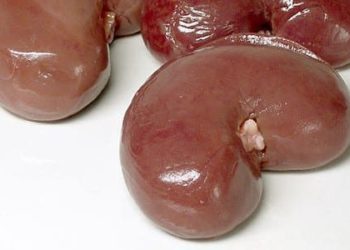#VisualAbstract: Cabozantinib improves progression-free survival in patients with metastatic papillary renal cell carcinoma
1. Progression-free survival was longer in patients in the cabozantinib group (9.0 months) than in the sunitinib group (5.6 months).
2. Occurrence of grade 3 or 4 adverse events were similar among patients in the cabozantinib and sunitinib groups.
Evidence Rating Level: 1 (Excellent)
Study Rundown: Papillary renal cell carcinoma (PRCC) is among the most severe forms of kidney cancer, comprising of one or more mutations in the MET (hepatocyte growth factor receptor) oncogene. Currently, the standard of care for patients with advanced or metastatic PRCC is a vascular endothelial growth factor (VEGF) inhibitor, sunitinib. However, studies suggest that MET inhibitors, such as cabozantinib, crizotinib, and savolitinib, may have beneficial effects and should be tested further. This multicenter, randomized controlled trial aimed to compare sunitinib with MET kinase inhibitors cabozantinib, crizotinib, and savolitinib for treatment of patients with PRCC. The primary endpoint for this study was progression free survival (PFS), while secondary endpoints included toxicity, objective response rate, and overall survival from baseline. According to study results, PFS was longer among patients in the cabozantinib group than in the sunitinib group. However, treatment with savolitinib and crizotinib did not improve PFS compared to sunitinib. This study was limited by a relatively small sample size since only 147 patients were included in the intention-to-treat analysis. Nevertheless, it provides valuable insight into the use of targeted therapy over an existing standard of care in patients with metastatic PRCC.
Click to read the study in The Lancet
Relevant Reading: Efficacy of Savolitinib vs Sunitinib in Patients With MET-Driven Papillary Renal Cell Carcinoma – The SAVOIR Phase 3 Randomized Controlled Trial
In-depth [randomized controlled trial]: Between Apr 5, 2016, and Dec 15, 2019, 152 patients were enrolled across 65 centers in the USA and Canada. Included patients were those ≥ 18 years of age with metastatic PRCC who received up to one previous systemic therapy (excluding vascular endothelial growth factor-directed and MET-directed agents). Patients with severe intercurrent illness or contraindications to study medications were excluded. Altogether, 147 patients (46 in sunitinib, 44 in cabozantinib, 28 in crizotinib, and 29 in savolitinib) were included in analysis. Among enrolled patients, the median age was 66 years (interquartile range [IQR] 58-75) and 76% (112 of 147) were male.
The primary endpoint concerning median PFS was significantly greater in the cabozantinib group (median 9.0 months, 95% confidence interval [CI] 5.6-12.4) compared to the sunitinib group (median 5.6 months, 95% CI 2.9-6.7, hazard ratio [HR] 0.60, 95% CI 0.37-0.97, p=0.019). Crizotinib (median 2.8 months, 95% CI 2.6-3.6) and savolitinib (median 3.0 months, 95% CI 2.8-7.2) did not improve PFS compared with sunitinib. The secondary endpoint of objective response rate was higher with cabozantinib (23%) than sunitinib (4%), crizotinib (0%), and savolitinib (3%). Similarly, median overall survival was greater for the cabozantinib group (20.0 months) than the sunitinib group (16.4 months), although this difference was not significant (HR 0.84, 95% CI 0.47-1.51). Grade 3 or 4 adverse events were seen in 69% (n=31) of patients in the sunitinib group and 74% (n=32) of patients in the cabozantinib group. In contrast, only 37% (n=10) in the crizotinib group and 39% (n=11) in the savolitinib group experienced grade 3 or 4 treatment-related outcomes. Findings from this study suggest that use of cabozantinib may improve progression-free survival compared to sunitinib in patients with metastatic papillary renal cell carcinoma. Further studies should be done to evaluate the efficacy of crizotinib and savolitinib.
©2020 2 Minute Medicine, Inc. All rights reserved. No works may be reproduced without expressed written consent from 2 Minute Medicine, Inc. Inquire about licensing here. No article should be construed as medical advice and is not intended as such by the authors or by 2 Minute Medicine, Inc.









